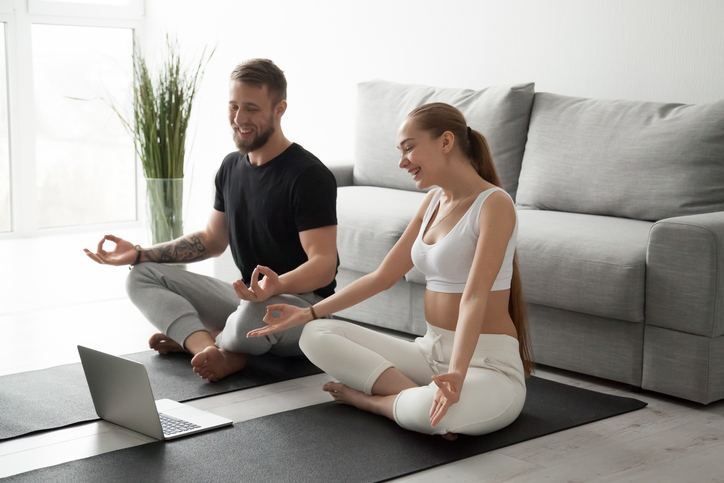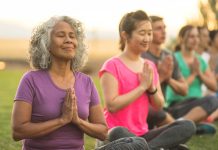From the couch choir to YouTube yoga, online communities are flourishing, as the restrictions on social gatherings to fight against the Coronavirus COVID-19 pandemic become tighter and tighter.

An online course facilitator and communicative engagement researcher from University of South Australia (UniSA), Kim Burley, says the speed at which people are adapting their social engagement from actual to virtual has been fast and fantastic.
“In these difficult times, it’s been a huge positive to see how quickly people can, and are, adapting,” Burley says.
“Some organisational behaviourists call this adaptation a property of complex systems where, when the equilibrium is punctuated by occurrences like we’ve seen this week, sub-systems form out of necessity and changing variables.
“These new sub-systems have new co-created goals and rules and those
individuals and organisations who do adapt quickly have a greater chance of
co-creating subsystems necessary for organisational survival and sense-making.”
She says many small businesses and sole traders most immediately hit by the restrictions, such as entertainers and personal trainers, are quickly adapting to deliver material online for their customers and to try to create new customers.
“Even as a teacher in social media … I could not have predicted how adeptly
many businesses and communications have moved to online in just a matter of
days,” Burley says.
“My son’s music lessons are now delivered via video call, my mother’s
conversational Italian classes are via video conferencing, and a funeral director
friend has gone from offering live streaming of funerals as an optional and
occasional extra, to including it as a standard feature.
“Lines of communication in personal relationships have opened up in unexpected
ways too – we have people scheduling afternoon teas with work colleagues and
even Friday night drinks via video conferencing.
“Personally, I’ve been at home with the sounds of my musician friends who are
now live streaming rather than performing at a local venue.”
Burley says people may actually feel more connected as their work and personal
communities converge and focus in virtual spaces.
“I am in touch more regularly with friends through online chat groups and am
checking in on those in my life who are in at-risk population groups such as the
elderly,” she says.
“When the pandemic is over, we need to continue to make these social
connections, particularly with those of us who are more susceptible to being
socially isolated.”
While Burley believes it is heartening to see the innovative ways humans adapt
in the face of adversity, we need to be careful about trying to replicate real
life in a digital environment.
“Communicating online has its own inherent characteristics, pitfalls, benefits,
and challenges,” she says. “For example, the main benefit of creating online
communities is the extraordinary reach – being able to be more inclusive of
more people, but one of the challenges is that some of these people might not
want to engage.
“For those who are introverts in real life, in social media this translates to
them becoming ‘lurkers’ in the online environment – they watch and follow but
tend not to participate so get less value out of the engagement.”
Burley says it is important to remember that online connectivity is only a
tool.
“You can harness the power of virtual connection but it does not magically
build those connections,” she says.
“An online community is usually based on something we do tangibly in the real
world so using the fortunate digital age in which we live to connect and belong
based on these real-life interests, hobbies and circumstances is important, but
it’s more important to cultivate them away from the digital world as well.
“Even though we’re more connected than ever before, we need to take the time
and space to explore real-world interests and hobbies.”
Burley recommends we step away from the screen sometimes and get out into the
backyard to plant that vegetable garden, learn that musical instrument you have
always wanted to try, dust off those paint brushes and start to create – then
join an online community related to it so you can stay connected during this
very isolating time.
Tips
for engaging in online communities
- Be aware of the increased cybersecurity risks and be careful about who you interact with online – if you wouldn’t let them inside your house, don’t let them into your online world.
- The phenomenon of the ‘portrayed self on social media vs the real self’ is becoming even more prevalent; now more than ever, remember that what is posted on social media is a curated version of someone’s life and personality, not reality.
- Social distancing will create a lot of mental health issues, so ensuring people have access to telephone or internet consultations with trained psychologists and counsellors is important; if you or someone you know needs support, reach out to an organisation like Beyond Blue.
Be kind on yourself. We have all seen people posting about their productivity and ability to seamlessly move to a more isolated environment with memes circulating like “Just a reminder that when Shakespeare was quarantined because of the plague, he wrote King Lear”. This is not helpful to those under pressure, working to deadlines with kids home from school, or the many of us who are feeling anxious for loved ones. It will take a while to develop routines of productivity in this new era of adaptation.








